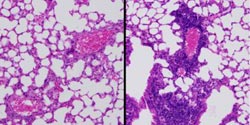Researchers identify components that keep immune system in check

A sample from a normal lung is on the left, and from a diseased lung on the right. Immune cells invade lung tissue when GATA-3 is absent in Tregs.<br>Credit: Wan Lab, UNC Lineberger Comprehensive Cancer Center.<br>
Now, researchers at the University of North Carolina at Chapel Hill have revealed the genetic underpinnings of the cells –called Foxp3-expressing regulatory T cells or Tregs – that can prevent the immune response from turning cannibalistic. Their finding lends insight into these key cells, which are currently being tested as treatments for diseases such as type I diabetes, arthritis and lupus.
“Understanding how the immune system is controlled can give people a better, bigger picture of how these diseases can emerge and could help us find more effective therapies in the future,” said senior study author Yisong Y. Wan, PhD, assistant professor of microbiology and immunology at the UNC School of Medicine.
The study, published online Sept. 15, 2011, in the journal Immunity, is the first to implicate a regulatory switch known as GATA-3 in Treg function and immune tolerance. The factor was known to regulate another type of immune cell, called a type-2 helper T cell, but its role in Tregs was unknown.
So Wan and his colleagues looked to see what would happen if they deleted the GATA-3 gene specifically in Tregs of mice. They found that the mutant mice developed a spontaneous inflammatory disorder, with abnormal immune cell invasion into tissues (Images). When they delved deeper, the scientists discovered that the Tregs were no longer able to suppress the immune system like they should. The researchers then traced this defect through the chain of command, from the Foxp3 that regulates Treg function (hence the name Foxp3-expressing regulatory T cells), up to the GATA-3 that regulates Foxp3.
Having uncovered this previously unknown function of GATA-3, Wan would now like to see what else this important master regulator may be controlling in immune cells. In particular, he is looking for components of the immune system that could be potential targets for correcting the underlying defects that lead to inflammatory and autoimmune diseases.
The research was funded by the National Institutes of Health, the Lupus Research Institute, and the University Cancer Research Fund. Study co-authors were Yunqi Wang, PhD, postdoctoral associate, and Maureen A. Su, MD, assistant professor in the UNC Thurston Arthritis Center.
Media Contact
More Information:
http://www.unc.eduAll latest news from the category: Health and Medicine
This subject area encompasses research and studies in the field of human medicine.
Among the wide-ranging list of topics covered here are anesthesiology, anatomy, surgery, human genetics, hygiene and environmental medicine, internal medicine, neurology, pharmacology, physiology, urology and dental medicine.
Newest articles

Webb captures top of iconic horsehead nebula in unprecedented detail
NASA’s James Webb Space Telescope has captured the sharpest infrared images to date of a zoomed-in portion of one of the most distinctive objects in our skies, the Horsehead Nebula….

Cost-effective, high-capacity, and cyclable lithium-ion battery cathodes
Charge-recharge cycling of lithium-superrich iron oxide, a cost-effective and high-capacity cathode for new-generation lithium-ion batteries, can be greatly improved by doping with readily available mineral elements. The energy capacity and…

Novel genetic plant regeneration approach
…without the application of phytohormones. Researchers develop a novel plant regeneration approach by modulating the expression of genes that control plant cell differentiation. For ages now, plants have been the…





















